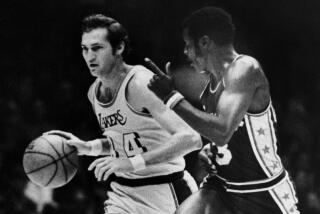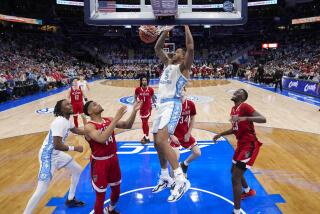West Virginia is more like Big East Virginia
- Share via
Reporting from Syracuse, N.Y. — There weren’t enough hankies in the land of Yankees a few weeks ago when the sound system blasted “Country Roads” after West Virginia won the Big East Tournament title at New York’s Madison Square Garden.
Bob Huggins then took his team home to the place they belong.
“Who is not going to get choked up?” Huggins recalled Monday. “ John Denver probably would have cried.”
Huggins, a West Virginia native and former player who returned to his alma mater in 2007, put the Mountaineers on the path to their first Final Four since 1959.
Huggins was raised worshiping local legends — Fred Schaus, Hot Rod Hundley and, of course, Jerry West.
“I can remember sitting on my grandfather’s lap listening to Jack Fleming call games,” Huggins said. “You know my grandfather never, never missed a game on the radio. I think there’s certainly thousands and thousands of people who grew up the same way.”
There’s nothing quite like an entire state rallying around its home-grown heroes.
Nine players on Butler’s Final Four team — including stars Matt Howard and Gordon Hayward — grew up in Indiana.
OK … stop.
The chicken-pot-pie part of West Virginia’s story ends here, at Huggins. The accents coming out of Mountaineers player mouths are dialects from New York, New Jersey, Rhode Island and Turkey.
Blue Ridge Mountains? Shenandoah River?
Try Brooklyn, Long Island, Newark, Mount Vernon and Istanbul.
It doesn’t make West Virginia’s revival any less exciting — only less romantic.
Homespun legends such as West and Hundley don’t come around very often in a state with big dreams but a small population.
The artery of Big East basketball is the New York area, so that’s where West Virginia goes mining.
Only one of West Virginia’s 16 players is from the state — seldom-used Cam Payne hails from Charleston. Jerry West’s son, Jonnie, is on the roster — but he’s from Memphis.
“Obviously, the Big East is strong in New York,” Huggins said. “If you’re a Big East school, it enables you to get into a lot of doors in metropolitan New York. I think certainly we wouldn’t have been involved with those guys if it were not for the Big East.”
The 2010 Mountaineers have their own “Mr. Clutch,” the nickname West would earn out of tiny Cabin Creek, W.Va.
The school’s modern-day sharpshooter, Da’Sean Butler, is from Newark.
A 6-foot-7 swingman, Butler has six game-winning shots this season, including the clincher with 4.2 seconds left to beat Georgetown in the Big East championship game.
Huggins, when he arrived after one season at Kansas State, inherited Butler and Wellington Smith (Summit, N.Y.) from coach John Beilein, who moved on to Michigan.
Huggins then built on those cornerstones.
When West Virginia lost starting point guard Darryl “Truck” Bryant (Brooklyn) last week to a broken foot, Huggins turned to Rhode Island product Joe Mazzulla.
Mazzulla, with 17 unexpected points, ended up being the star of West Virginia’s East Regional victory over Kentucky.
“It’s just great to be a representative of Rhode Island,” Mazzulla said. “I kind of feel like a West Virginian too, because of how much they support you and stuff like that. As much as I did it for Rhode Island, it’s just as important for West Virginia.”
West Virginia also got key Kentucky-win contributions from Devin Ebanks (12 points, Long Island City, N.Y.) and Kevin Jones (13 points, Mount Vernon, N.Y.).
“There’s just something about New York,” Jones said after clinching the East Regional in Syracuse. “It’s very special doing it in front of all your friends and family watching. … We definitely did it for the state of West Virginia. We’re going to come back to West Virginia and enjoy it.”
For muscle off the bench, Huggins leans on 6-9 Deniz Kilicli, from Istanbul.
When Huggins needs help from West Virginia, he has to look in the mirror. He has built this team in the blue-collar, hard-working image of his home state.
Butler is a bigger, stronger and much more animated version of West, yet has similar aptitude for performance under pressure.
How does he do it?
“I have no clue,” Butler said. “I couldn’t tell you the answer to that at all. … Plays are set up for me. I go out there calm and relaxed and focus on what I need to do when I get out there and get the ball.”
Butler has been practicing game-winning shots all his life.
“Oh yeah, all the time, I still do it to this day,” he said. “I’ll be messing around in the gym, the clock is running down. … I have a good imagination. I was an only child, so I was by myself a lot.”
Taking imagination liberties, Butler has ditched “One Shining Moment,” the montage song CBS plays at the end of the NCAA title game, and replaced it with R. Kelly’s “The World’s Greatest.”
Butler, naturally, has just nailed the game winner.
“Everyone’s running on the floor, and I’m crying,” Butler explained. “I have a lot of scenarios I put in my head. It’s all clips of me — all me. It’s my dream.”
If the Mountaineers win the national title, the ZIP Codes of the heroes will mean zip.
It’s almost heaven (two wins), West Virginia.
Take it home.
John Denver, for what it’s worth, was born in New Mexico.
More to Read
Go beyond the scoreboard
Get the latest on L.A.'s teams in the daily Sports Report newsletter.
You may occasionally receive promotional content from the Los Angeles Times.











